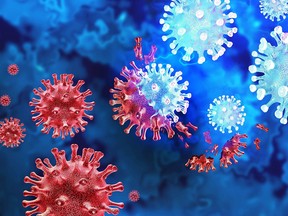With COVID-19 cases showing a slight rise and the new variant dubbed Eris making inroads, questions are being raised over where the numbers are headed in Quebec, and if it’s time to consider getting another booster shot.
Health
As a new variant takes hold, what’s the COVID-19 situation in Quebec?

“If we’re talking about community transmission and if we go by wastewater testing data, which is limited, we are seeing a slight inflection point upwards suggesting there’s a resurgence of community transmission,” said Dr. Donald Vinh, an epidemiologist at the McGill University Health Centre.
The number of people hospitalized with COVID-19 rose to 431 as of Aug. 8, including 16 patients in the intensive care unit, after dropping to a low of 364 in late July. Those numbers are are far below figures seen in early January, when more than 2,100 patients were hospitalized.
INSPQ data from late July show that roughly two people died every day in Quebec due to COVID-19.
How much of a concern is the new subvariant Eris?
Eris, or EG.5.1, which has become the dominant strain of COVID-19 in the United States and is spreading in Quebec, appears to be more transmissible than previous incarnations, but does not cause more severe infections. On Wednesday, the World Health Organization classified the EG.5.1 strain as a “variant of interest” but said it didn’t seem to pose more of a threat to public health than other variants.
“More people may be getting sick, but they’re not getting very sick,” Vinh said. “They may say they feel a bit crummy, or have a sore throat or feel achy or feverish, but their lives are not in jeopardy.”
They may still be symptomatic enough to have to miss school or work, he noted.
Eris accounted for 18 per cent of new cases in Quebec in mid-July, data compiled by the INSPQ indicates.
Do previous vaccines or infections protect against the most recent strain?
Most people who have acquired immunity through basic vaccination and/or infection are safe from major complications from COVID, the INSPQ said. You can still have respiratory symptoms and even a little fever, as with other respiratory infections. Unvaccinated people and those with medical conditions that put them at risk can still suffer from severe complications. Those who haven’t been vaccinated yet should do so, the health research body counselled.
Antibodies derived through vaccinations or previous infections appear to wear off after six months or so, making it a good idea to get a booster shot eventually, Vinh added.
When should you get a booster shot?
Canada’s National Advisory Committee on Immunization (NACI) recommends waiting until the fall to get the latest booster dose, which will have a formulation targeting more recent variants, as long as it’s been six months since individuals were last infected or vaccinated. The INSPQ gives the same advice. The updated doses are expected in the United States in September, and in Canada in October or November. Some jurisdictions may offer a COVID-19 vaccination and a flu shot at the same time, NACI notes.
Those who have not yet been vaccinated or are immunocompromised or do not want to risk getting sick in the summer might want to get a booster now if they haven’t yet had three doses, Vinh said.
In some people, multiple infections of COVID-19 can lead to long COVID, where debilitating symptoms last for months, but doctors are not able to predict who will be affected this way. “It’s a bit like Russian roulette,” Vinh said. So the best course of action is to avoid getting infected.
What happens when students go back to school?
“I think numbers will go up for several reasons,” Vinh said. “Even though there have been improvements in the installation of ventilation systems, it’s still far from optimal. So when you have kids who have a virus in a closed, poorly ventilated space, you can anticipate an increase around September.”
With students bringing it back home, it’s only a matter of time before the virus is brought back into the vicinity of people at risk, and “you can see that perfect storm is starting to brew,” he said.
Dr. Judith Fafard, medical director of the public health laboratory of Quebec, said in an interview with La Presse that regions like the Quebec City area and Saguenay-Lac-St-Jean where numerous festivals were held saw an above-average increase in COVID cases.
Could we see a return to mandatory masking?
It’s unlikely the government would enforce public masking unless another full-blown pandemic occurs, Vinh said. Quebec ended all remaining COVID-19 directives and measures related to the pandemic on July 19. But the INSPQ notes that people who have symptoms of respiratory infection are recommended to wear a mask in order to protect others, and people at risk of complications from COVID who attend gatherings should wear one.
Where can I get a vaccination or a test?
Residents can register for a free vaccine shot online with Clic Santé, by calling 1-877-644‑4545, and through the Santé Montreal website. There are also eight walk-in vaccination sites listed on the Santé Montreal site where residents can get a shot in Montreal without an appointment, depending on their age.
To get tested at a screening centre, you must be healthcare or social services worker, have COVID-19 symptoms that may be treatable with a drug such as Paxlovid, or if you are going into surgery or for hospitalization. Otherwise you will need a COVID-19 rapid test. Quebec stopped giving those out for free in May, except for those considered vulnerable, including the immunocompromised, those over 60 and pregnant women.
Free tests are available at all COVID-19 vaccination sites and screening clinics.

Health
How many Nova Scotians are on the doctor wait-list? Number hit 160,000 in June

HALIFAX – The Nova Scotia government says it could be months before it reveals how many people are on the wait-list for a family doctor.
The head of the province’s health authority told reporters Wednesday that the government won’t release updated data until the 160,000 people who were on the wait-list in June are contacted to verify whether they still need primary care.
Karen Oldfield said Nova Scotia Health is working on validating the primary care wait-list data before posting new numbers, and that work may take a matter of months. The most recent public wait-list figures are from June 1, when 160,234 people, or about 16 per cent of the population, were on it.
“It’s going to take time to make 160,000 calls,” Oldfield said. “We are not talking weeks, we are talking months.”
The interim CEO and president of Nova Scotia Health said people on the list are being asked where they live, whether they still need a family doctor, and to give an update on their health.
A spokesperson with the province’s Health Department says the government and its health authority are “working hard” to turn the wait-list registry into a useful tool, adding that the data will be shared once it is validated.
Nova Scotia’s NDP are calling on Premier Tim Houston to immediately release statistics on how many people are looking for a family doctor. On Tuesday, the NDP introduced a bill that would require the health minister to make the number public every month.
“It is unacceptable for the list to be more than three months out of date,” NDP Leader Claudia Chender said Tuesday.
Chender said releasing this data regularly is vital so Nova Scotians can track the government’s progress on its main 2021 campaign promise: fixing health care.
The number of people in need of a family doctor has more than doubled between the 2021 summer election campaign and June 2024. Since September 2021 about 300 doctors have been added to the provincial health system, the Health Department said.
“We’ll know if Tim Houston is keeping his 2021 election promise to fix health care when Nova Scotians are attached to primary care,” Chender said.
This report by The Canadian Press was first published Sept. 11, 2024.
The Canadian Press. All rights reserved.
Health
Newfoundland and Labrador monitoring rise in whooping cough cases: medical officer

ST. JOHN’S, N.L. – Newfoundland and Labrador‘s chief medical officer is monitoring the rise of whooping cough infections across the province as cases of the highly contagious disease continue to grow across Canada.
Dr. Janice Fitzgerald says that so far this year, the province has recorded 230 confirmed cases of the vaccine-preventable respiratory tract infection, also known as pertussis.
Late last month, Quebec reported more than 11,000 cases during the same time period, while Ontario counted 470 cases, well above the five-year average of 98. In Quebec, the majority of patients are between the ages of 10 and 14.
Meanwhile, New Brunswick has declared a whooping cough outbreak across the province. A total of 141 cases were reported by last month, exceeding the five-year average of 34.
The disease can lead to severe complications among vulnerable populations including infants, who are at the highest risk of suffering from complications like pneumonia and seizures. Symptoms may start with a runny nose, mild fever and cough, then progress to severe coughing accompanied by a distinctive “whooping” sound during inhalation.
“The public, especially pregnant people and those in close contact with infants, are encouraged to be aware of symptoms related to pertussis and to ensure vaccinations are up to date,” Newfoundland and Labrador’s Health Department said in a statement.
Whooping cough can be treated with antibiotics, but vaccination is the most effective way to control the spread of the disease. As a result, the province has expanded immunization efforts this school year. While booster doses are already offered in Grade 9, the vaccine is now being offered to Grade 8 students as well.
Public health officials say whooping cough is a cyclical disease that increases every two to five or six years.
Meanwhile, New Brunswick’s acting chief medical officer of health expects the current case count to get worse before tapering off.
A rise in whooping cough cases has also been reported in the United States and elsewhere. The Pan American Health Organization issued an alert in July encouraging countries to ramp up their surveillance and vaccination coverage.
This report by The Canadian Press was first published Sept. 10, 2024.
The Canadian Press. All rights reserved.
Health
Bizarre Sunlight Loophole Melts Belly Fat Fast!
Product Name: Bizarre Sunlight Loophole Melts Belly Fat Fast!
All orders are protected by SSL encryption – the highest industry standard for online security from trusted vendors.

Bizarre Sunlight Loophole Melts Belly Fat Fast! is backed with a 60 Day No Questions Asked Money Back Guarantee. If within the first 60 days of receipt you are not satisfied with Wake Up Lean™, you can request a refund by sending an email to the address given inside the product and we will immediately refund your entire purchase price, with no questions asked.
-

 News14 hours ago
News14 hours agoB.C. to scrap consumer carbon tax if federal government drops legal requirement: Eby
-

 Sports15 hours ago
Sports15 hours agoLawyer says Chinese doping case handled ‘reasonably’ but calls WADA’s lack of action “curious”
-

 News14 hours ago
News14 hours agoA linebacker at West Virginia State is fatally shot on the eve of a game against his old school
-

 Sports9 hours ago
Sports9 hours agoCanada’s Marina Stakusic advances to quarterfinals at Guadalajara Open
-

 News14 hours ago
News14 hours agoHall of Famer Joe Schmidt, who helped Detroit Lions win 2 NFL titles, dies at 92
-

 News15 hours ago
News15 hours agoRCMP say 3 dead, suspects at large in targeted attack at home in Lloydminster, Sask.
-
News24 hours ago
Local Toronto business story – Events Industry : new national brand, Element Event Solutions
-

 News15 hours ago
News15 hours agoProvinces decry Ottawa’s plan to resettle asylum seekers across the country



















